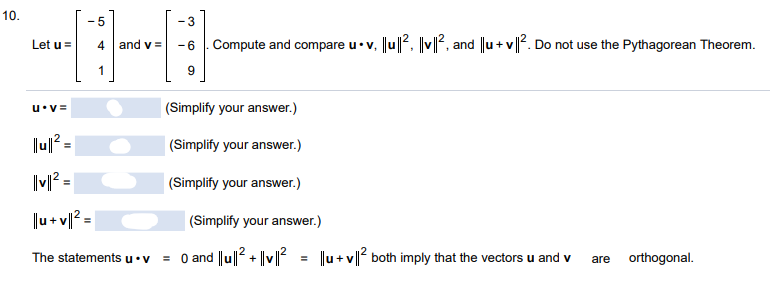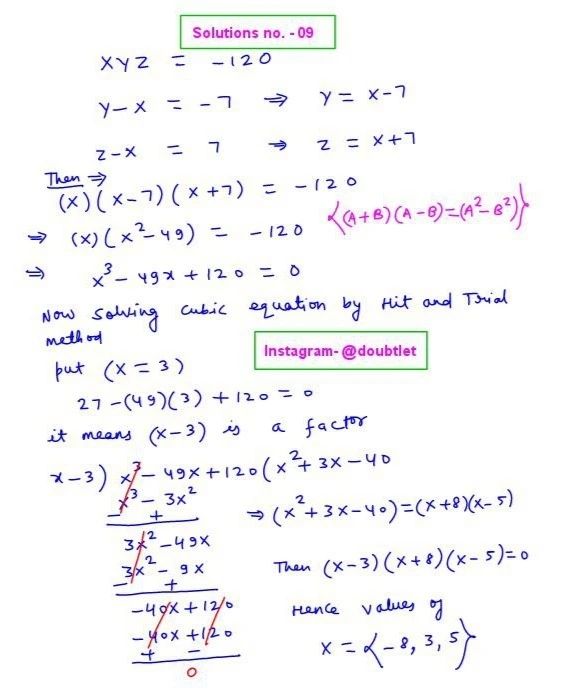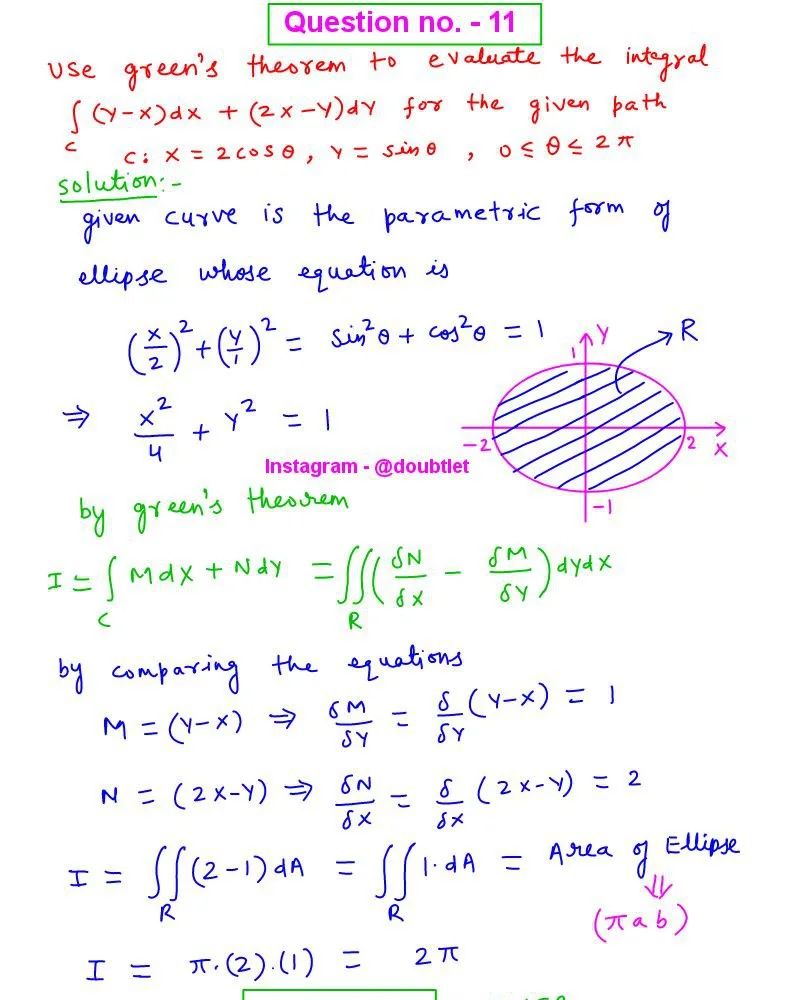Neetesh Kumar | October 18, 2024
Linear Algebra Homework Help
This is the solution to Math2B Course: Linear Algebra Assignment: Ch6 Section 1 Question Number 10 Contact me if you need help with Homework, Assignments, Tutoring Sessions, or Exams for STEM subjects. Testimonials or Vouches from here of the previous works I have done.
Get Linear Algebra Homework Help
Step-by-step solution:
Step 1: Compute u ⋅ v \mathbf{u} \cdot \mathbf{v} u ⋅ v
The dot product u ⋅ v \mathbf{u} \cdot \mathbf{v} u ⋅ v
u ⋅ v = ( − 5 ) ( − 3 ) + ( 4 ) ( − 6 ) + ( 1 ) ( 9 ) = 15 − 24 + 9 = 0 \mathbf{u} \cdot \mathbf{v} = (-5)(-3) + (4)(-6) + (1)(9) = 15 - 24 + 9 = 0 u ⋅ v = ( − 5 ) ( − 3 ) + ( 4 ) ( − 6 ) + ( 1 ) ( 9 ) = 15 − 24 + 9 = 0
Thus, u ⋅ v = 0 \mathbf{u} \cdot \mathbf{v} = 0 u ⋅ v = 0
Step 2: Compute ∥ u ∥ 2 \|\mathbf{u}\|^2 ∥ u ∥ 2
The square of the magnitude of u \mathbf{u} u
∥ u ∥ 2 = ( − 5 ) 2 + ( 4 ) 2 + ( 1 ) 2 = 25 + 16 + 1 = 42 \|\mathbf{u}\|^2 = (-5)^2 + (4)^2 + (1)^2 = 25 + 16 + 1 = 42 ∥ u ∥ 2 = ( − 5 ) 2 + ( 4 ) 2 + ( 1 ) 2 = 25 + 16 + 1 = 42
Thus, ∥ u ∥ 2 = 42 \|\mathbf{u}\|^2 = 42 ∥ u ∥ 2 = 42
Step 3: Compute ∥ v ∥ 2 \|\mathbf{v}\|^2 ∥ v ∥ 2
The square of the magnitude of v \mathbf{v} v
∥ v ∥ 2 = ( − 3 ) 2 + ( − 6 ) 2 + ( 9 ) 2 = 9 + 36 + 81 = 126 \|\mathbf{v}\|^2 = (-3)^2 + (-6)^2 + (9)^2 = 9 + 36 + 81 = 126 ∥ v ∥ 2 = ( − 3 ) 2 + ( − 6 ) 2 + ( 9 ) 2 = 9 + 36 + 81 = 126
Thus, ∥ v ∥ 2 = 126 \|\mathbf{v}\|^2 = 126 ∥ v ∥ 2 = 126
Step 4: Compute ∥ u + v ∥ 2 \|\mathbf{u} + \mathbf{v}\|^2 ∥ u + v ∥ 2
First, find u + v \mathbf{u} + \mathbf{v} u + v
u + v = [ − 5 4 1 ] + [ − 3 − 6 9 ] = [ − 8 − 2 10 ] \mathbf{u} + \mathbf{v} = \begin{bmatrix} -5 \\ 4 \\ 1 \end{bmatrix} + \begin{bmatrix} -3 \\ -6 \\ 9 \end{bmatrix} = \begin{bmatrix} -8 \\ -2 \\ 10 \end{bmatrix} u + v = − 5 4 1 + − 3 − 6 9 = − 8 − 2 10
Now, compute the square of the magnitude of u + v \mathbf{u} + \mathbf{v} u + v
∥ u + v ∥ 2 = ( − 8 ) 2 + ( − 2 ) 2 + ( 10 ) 2 = 64 + 4 + 100 = 168 \|\mathbf{u} + \mathbf{v}\|^2 = (-8)^2 + (-2)^2 + (10)^2 = 64 + 4 + 100 = 168 ∥ u + v ∥ 2 = ( − 8 ) 2 + ( − 2 ) 2 + ( 10 ) 2 = 64 + 4 + 100 = 168
Thus, ∥ u + v ∥ 2 = 168 \|\mathbf{u} + \mathbf{v}\|^2 = 168 ∥ u + v ∥ 2 = 168
Final Results:
u ⋅ v = 0 \mathbf{u} \cdot \mathbf{v} = 0 u ⋅ v = 0 ∥ u ∥ 2 = 42 \|\mathbf{u}\|^2 = 42 ∥ u ∥ 2 = 42 ∥ v ∥ 2 = 126 \|\mathbf{v}\|^2 = 126 ∥ v ∥ 2 = 126 ∥ u + v ∥ 2 = 168 \|\mathbf{u} + \mathbf{v}\|^2 = 168 ∥ u + v ∥ 2 = 168
Since u ⋅ v = 0 \mathbf{u} \cdot \mathbf{v} = 0 u ⋅ v = 0 ∥ u ∥ 2 + ∥ v ∥ 2 = ∥ u + v ∥ 2 \|\mathbf{u}\|^2 + \|\mathbf{v}\|^2 = \|\mathbf{u} + \mathbf{v}\|^2 ∥ u ∥ 2 + ∥ v ∥ 2 = ∥ u + v ∥ 2 u \mathbf{u} u v \mathbf{v} v
Please comment below if you find any error in this solution.
If this solution helps, then please share this with your friends.
Please subscribe to my
Youtube channel for video solutions to similar questions.
Keep Smiling :-)















Leave a comment